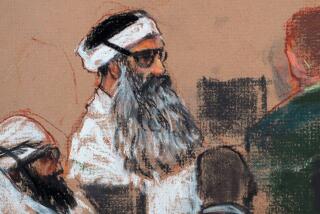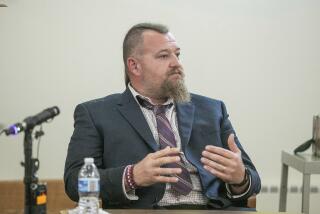No verdict in British terror trial
- Share via
LONDON — The trial of three alleged accomplices of the suicide bombers who struck the London transit system on July 7, 2005, killing 52 people, ended Friday when the jury failed to reach a verdict.
Prosecutors had charged that the men helped scout targets during an alleged reconnaissance trip to London. The trio admitted training at militant camps in Pakistan, and physical evidence tied them to apartments where the backpack bombs were assembled, according to testimony.
Although the defendants testified that they supported combat by Muslim militant groups overseas, they denied any role in the bombings. The jury deliberated for 15 days before concluding they could not reach a verdict.
The judge scheduled a hearing in September for Waheed Ali, 25, Sadeer Saleem, 28, and Mohammed Shakil, 32. They will remain in custody while prosecutors decide whether to seek a new trial on charges of conspiracy to cause explosions.
The outcome highlights the hazards and ambiguities of terrorism prosecutions, even when there is evidence of apparently sinister activity and suspicious contacts. As the first suicide attacks in Western Europe, the London blasts are a high-profile case, but authorities struggled to link the alleged accomplices to specific crimes.
Ali, Saleem and Shakil testified that they condemned the bombings as “unIslamic” attacks on innocent civilians. But at the same time, they expressed radical political views and a willingness to fight for Muslim causes in South Asia. All three admitted making trips to Pakistan to train at militant camps, including one with the lead London bomber, Mohamed Sidique Khan.
“If it got down to fighting, I would have gone wherever my emir [commander] sent me,” Ali told the court.
The jury was shown surveillance footage of Ali with Khan, who was allegedly trained and directed by Al Qaeda masterminds in Pakistan. Prosecutors used cellphone tracking data to map the defendants’ and two of the bombers’ travels in London on Dec. 16-17, 2004.
The group visited tourist sites such as the London Eye and the Natural History Museum. Their itinerary “bore a striking similarity” to the movements of the bombers seven months later when they blew up three subway trains and a bus, prosecutors asserted.
But the defendants denied ever having entered the London subway system. They testified they went to London to visit Ali’s sister and do a little sightseeing.
In response to Friday’s outcome, Robert Webb, whose 29-year-old sister, Laura, died in one of the explosions, said his family did not want to see an “incorrect” verdict.
“We don’t want to see innocent people jailed or guilty people go free,” Webb told the BBC. “It is far better that it takes a long time to reach a verdict. . . . For my part, I have to live with what happened every day and I will be living with it every day regardless of what happens in the legal process.”
--
Stobart reported from London and Rotella from Madrid.
More to Read
Sign up for Essential California
The most important California stories and recommendations in your inbox every morning.
You may occasionally receive promotional content from the Los Angeles Times.













